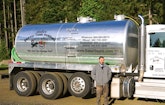Name and title or job description: Andrew Gunia, owner and chief executive officer
Business name and location: A Advanced Septic Services, Sumner, Washington
Age: 56
Years in the industry: 34
Association involvement: I joined the Washington On-Site Sewage Association in 1998 and have served in many board positions, but now I’m letting the young blood get in there while still maintaining a voice. My son Joshua is a vice president and my son Jeremiah is the operations and maintenance representative.
Benefits of belonging to the association: It gives us the ability to influence the industry. We also gain knowledge of proposed regulatory changes and can either influence them or mentally adjust for them before they happen. We’re recognized as an authority. And we can educate competitors because when somebody gets into the business, they don’t know a whole lot about the codes and laws so they’re out there doing things incorrectly. Therefore, we’re not competing on equal ground and the consumer can suffer from their lack of knowledge. These guys mean well; they just don’t know. So we’re really big on sharing and educating everyone. The end result is you’re making investments in these people, and consequently they end up being friendly competitors as opposed to adversaries.
Biggest issue facing your association right now: For a while, there was a lack of young guys coming into the industry, but in this robust economy, there are a handful of startups now. So far it’s been hard to get them to participate in the association. They join for the benefits but don’t get involved.
Our crew includes: We employ approximately 74 men and women — office staff, pumpers, installers. We also have maintenance providers. In the Northwest, we have what’s called the operation and maintenance program, which is a higher level of service than pumper. And we have a trucking division and have expanded into civil work — street improvements and plat work.
Typical day on the job: Starting time is 5:30 a.m. I provide oversight and presence for morning dispatch. I’ve worked myself out of day-to-day affairs, but I meet with my managers throughout the week. I deal with health department and county issues, participating on committees and working to keep out rules that don’t benefit anyone. I negotiate vendor contracts. I also provide what I call “janitorial” services for the company. There’s a statistic that says 2% of the people you can’t make happy no matter what. I don’t pay anyone enough to deal with those people, so I do it.
Helping hands – Indispensable crew member: Joshua Gunia, co-owner and vice president, and Aaron Peterson, chief operating officer, are responsible for the day-to-day operations. They’re trustworthy and willing to tell me everything people don’t want me to know. There’s a saying around here — everybody’s going to make a mistake today. But once it’s identified and owned and fixed, we get to move on. My job is to make it safe for issues to be brought forward — not yell and threaten, but educate and coach.
The job I’ll never forget: There was a home on Puget Sound that had no access from the street. The owners had to walk 500 feet on a dirt path to get home every day. When they needed a major repair to their septic system, we had to get special permission, access a boat ramp, and in low tide travel a half mile across the beach with several excavators, vacuum trucks and all our equipment. The project took a couple weeks.
Some equipment we could leave, but every day we had to be out before the tide came in. On top of that, it was a postage stamp-sized lot. We had to remove the decking and install a membrane filter with drip irrigation. One of our pump trucks got stuck in the sand while the tide was coming in. Fortunately one of our dump trucks was nearby and we were able to tow ourselves out before we made the news.
My favorite piece of equipment: My favorite is whatever is the right tool for the job — and that’s truly my answer. Growing up in the industry and watching some of my competitors, I’ve seen guys put too big of an excavator on a job, which can cause unnecessary damage to the property, or they use one that’s too small and risk the safety of their men. I invest in tools and equipment that enable us to do the best possible job while sustaining safety and quality and minimizing the cost to the consumer.
But after that, our excavators are a preferred choice of equipment. We have 10 ranging from 4,000 to 70,000 pounds (Kubota and Caterpillar). I also like the Terralift (Terralift International Family of Companies) soil restoration equipment. When I saw that many times people were getting replacement drainfields when they didn’t need to, we developed this concept of rehabilitating them.
Most challenging site I’ve worked on: A lakefront property that used to be a cabin got remodeled to a 5,000-square-foot house. When the primary drainfield failed, the previous owner had bootlegged the drainfield into what little area was left in the front yard. The new buyer moved in with a family of five and the system blew out in the first 30 days. There was nowhere to go with a repair drainfield and we couldn’t purchase an easement from adjacent properties so we had to figure out how to work within the available space, which was occupied by a driveway and a very small front yard that had already been disturbed.
We collaborated with a local designer who was willing to go out on a limb and challenge the codes. Through BioMicrobics membrane bioreactors, we cleaned the effluent to a high level of treatment that actually met stormwater treatment levels. Once we got the county to agree to let us dispose of the effluent as stormwater, that removed many of the restrictive codes. We put the drainfield under the driveway because that was the only undisturbed soil on the property and used stormwater infiltrators because they have an H-20 rating, enabling us to pour a new concrete driveway on top of the drainfield, which health department code does not allow but stormwater code does. In the process, we reached out to the seller and — by carefully navigating through it without accusing him — suggested he’d be ahead if he was willing to contribute half the repair. And we helped the buyer understand he should pay half because he ended up with a new system with the latest technology. It was a win-win for both.
The craziest question I’ve been asked by a customer: Will this new system allow me to flush toilet paper?
If I could change one industry regulation, it would be: We’re fortunate to work in an area where we have great relationships with all the disciplines in our business, including the regulators. We have been able to address the issues as they come up. Sometimes it takes time. Right now I couldn’t come up with a regulation I’d want to change.
Best piece of small-business advice I’ve heard: Two things: Know what not to do, and it’s the journey and not the destination.
If I wasn’t working in the wastewater industry, I would: I don’t know. I straight up love this industry.
Crystal ball time – This is my outlook for the wastewater industry: Through education and regulations, we will continue to strengthen the profession, public health and the ability for the consumer to experience the best possible return on their system. I’m looking forward to better dewatering/treatment of septage as our technology continues to evolve.








